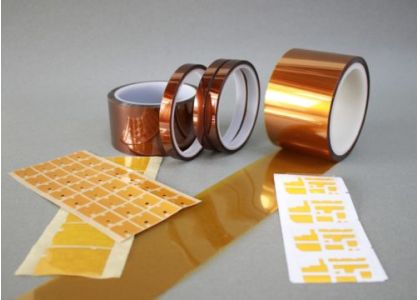
When sourcing high-quality Kapton tape, especially from a reputable polyimide tape manufacturer, quality control is paramount. The integrity of amber Kapton adhesive tape and the appropriate polyimide film thickness can significantly affect the performance of applications in electronics, aerospace, and insulation. Maintaining strict quality control measures ensures that the tape meets performance expectations, providing reliable thermal and electrical insulation in various demanding environments.
Polyimide tape, commonly known as Kapton tape, is a high-performance tape that can withstand extreme temperatures ranging from -269°C to +400°C. Its unique properties make it suitable for a wide variety of applications, including:
· Electrical Insulation: Because of its excellent dielectric strength, polyimide tape is ideal for insulating wires and circuit boards.
· Thermal Protection: It protects sensitive components from heat during manufacturing processes, particularly in soldering and reflow operations.
· Surface Protection: Kapton tape is used in industries such as aerospace and electronics to shield surfaces from contaminants and other environmental factors.
Quality control in the production of polyimide tape encompasses several critical factors that must be monitored throughout the manufacturing process. This approach ensures that the final product meets not only industry standards but also specific customer requirements.
The quality of the raw materials used in polyimide tape production is foundational to the integrity of the final product. Manufacturers must thoroughly inspect materials before use:
· Polyimide Resin: High-quality polyimide resin contributes to the overall performance of the tape, ensuring thermal stability and chemical resistance.
· Adhesive Quality: The adhesive used in amber Kapton adhesive tape must be evaluated for consistency, bonding strength, and temperature resistance.
The polyimide film thickness must be accurate and consistent for optimal performance. Variations in thickness can lead to differences in mechanical properties and insulation capabilities.
· Precision Measurement Tools: Manufacturers should utilize precise measurement tools to ensure that the film thickness remains within specified tolerances.
· Testing Standards: Following industry-recognized testing standards helps verify that the film thickness meets performance expectations for various applications.
Adhesion strength is a crucial parameter that affects how well the polyimide tape adheres to different substrates. Quality control tests for adhesion should include:
· Peel Adhesion Tests: These tests measure the force required to peel the tape away from a surface, indicating how well it will perform in real-world applications.
· Temperature Cycling: Testing the tape's bonding strength under temperature fluctuations helps ensure that it remains reliable even in extreme conditions.
Working with a polyimide tape manufacturer that adheres to rigorous quality standards is vital for ensuring high product performance. Look for manufacturers that hold certifications such as ISO 9001, which indicates a commitment to quality management systems. Compliance with these standards ensures that the manufacturing process includes adequate quality checks.
A case study involving a leading aerospace manufacturer highlights the impact of quality control in polyimide tape production. This manufacturer had previously faced significant issues with tape performance, leading to failures in thermal insulation and electrical insulation during critical production phases.
After switching to a polyimide tape manufacturer who implemented strict quality control measures, they observed substantial improvements. The new tape had consistent polyimide film thickness and superior adhesion properties. Consequently, the manufacturer experienced a 30% reduction in production defects and a 15% increase in overall efficiency.
An electronics company that routinely uses high-quality Kapton tape reported, "After switching to this manufacturer, we noticed a marked improvement in the quality of our production. The consistency in film thickness and adhesive performance has reduced our downtime significantly."
Quality control is essential in the production of polyimide tape, particularly when it comes to ensuring products like amber Kapton adhesive tape meet performance expectations. By focusing on raw material inspection, precise measurement of polyimide film thickness, and rigorous adhesion testing, manufacturers can produce reliable tape suitable for demanding applications in various industries.
For companies requiring high-performance tape, it's crucial to collaborate with a reputable polyimide tape manufacturer that prioritizes quality control. This partnership will not only enhance product reliability but also optimize overall operational efficiency, ensuring that performance meets or exceeds expectations. By adhering to these best practices and using the right materials, businesses can safeguard their operations against failures and maximize the advantages offered by high-quality polyimide tapes.